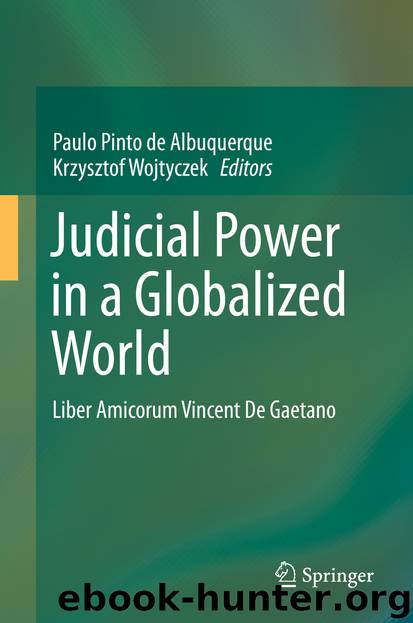Judicial Power in a Globalized World by Paulo Pinto de Albuquerque & Krzysztof Wojtyczek

Author:Paulo Pinto de Albuquerque & Krzysztof Wojtyczek
Language: eng
Format: epub
ISBN: 9783030207441
Publisher: Springer International Publishing
5 The Limits of Immunity for a Legal Error: The US Experience
In the USA the federal statute provides that a federal judge is subject to disciplining if (s)he “has engaged in conduct prejudicial to the effective and expeditious administration of the business of the courts”.7 The litigants try to use the complaints procedure to appeal judicial decisions, but the statute directs, on the federal level, the dismissal of any complaint that is “directly related to the merits of a decision or procedural ruling”.8 Nevertheless, a measure of judicial liability for the substance of judicial decision remains to be a possibility on the federal level.
As regards state jurisdictions, many State codes of judicial conduct address this issue. The codes establish that a judge should perform the duties of judicial office impartially, competently, and diligently, specifying in comments that a “good-faith error” of fact or law does not violate this rule. In particular, such comment is included in judicial conduct codes in Arizona, Colorado, Connecticut, Georgia, Idaho, Indiana, Iowa, Kentucky, Maryland, Massachusetts, Montana, Ohio, Pennsylvania, Washington, West Virginia and Wyoming.
An explanation of what may constitute a “bad-faith error” has been made in the comments to the Massachussetts Code of Judicial Conduct, which claims that “in the absence of fraud, corrupt motive, or clear indication that the judge’s conduct was in bad faith or otherwise violates this Code, it is not a violation for a judge to make findings of fact, reach legal conclusions, or apply the law as the judge understands it”.9
According to the comments to the Arizona Code of Judicial Conduct, “a pattern of legal error” or “an intentional disregard of the law” may constitute misconduct.10 The Maine Code of Judicial Conduct states that an error of law in a judicial decision, “whether recognized on appeal or not”, shall not constitute a violation of the Code unless the judge’s action demonstrates “wilful or repeated disregard of explicit requirements of the law”.11 According to the advisory note to that rule, the terms of Rule 2.2 emphasise that to give rise to an ethical concern, the error of law or failure to be “faithful to the law” at issue must be much more serious and apparent than an error of law that may lead to a trial court action being vacated or criticized for an error of law on appeal.12
In upholding the distinction between honest legal errors and the mistakes which require disciplinary sanctions the judicial conduct organisations underline that merely legal errors are to be remedied in the ordinary way of judicial review of the court decisions. For example, the Massachusetts Commission on Judicial Conduct pointed out in its annual report that “the Commission does not have the power to determine whether a judge made the correct decision; that is for appellate courts.”13 Similar reservations have been made by the Kansas Commission on Judicial Qualifications14 and the Maine Committee on Judicial Responsibility and Disability.15
Download
This site does not store any files on its server. We only index and link to content provided by other sites. Please contact the content providers to delete copyright contents if any and email us, we'll remove relevant links or contents immediately.
The Social Psychology of Inequality by Unknown(3018)
The Plant Paradox by Dr. Steven R. Gundry M.D(2611)
The Writing on the Wall by Anselm Jappe(2040)
Working for Yourself by J.D. (Nolo) Stephen Fishman(1865)
Get What's Yours for Medicare by Philip Moeller(1686)
Every Landlord's Legal Guide by Janet Portman & Stewart Marcia & Ralph Warner(1664)
The First 20 Hours: How to Learn Anything ... Fast by Kaufman Josh(1662)
ADHD on Trial by Michael Gordon(1574)
Decisive by Chip Heath(1561)
Working for Yourself by Stephen Fishman J.D. (Nolo)(1525)
Drafting Contracts: How and Why Lawyers Do What They Do, Second Edition by Stark Tina L(1498)
A Practical Guide to International Arbitration in London by Hilary Heilbron(1434)
The Lord of the Rings: The Fellowship of the Ring, the Two Towers, the Return of the King by J. R. R. Tolkien(1430)
Restitution by Restitution(1424)
The Economist Aug 8th 2015 by The Economist(1423)
Intellectual Property Strategy by John Palfrey(1419)
The Economist Aug 29th 2015 by The Economist(1388)
Collusion by Luke Harding(1315)
Persuasion by Owner(1293)
